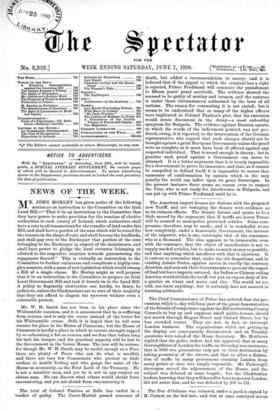The trial of Colonel Panitza at Sofia has ended in
a verdict of guilty. The Court-Martial passed sentence of death, but added a recommendation to mercy; and it is believed that if the appeal to which the criminal has a right is rejected, Prince Ferdinand will commute the punishment to fifteen years' penal servitude. The evidence showed the accused to be guilty of mutiny and treason, and the sentence is under those circumstances authorised by the laws of all nations. The reason for commuting it is not stated; but it seems to be understood that so many of the higher officers were implicated in Colonel Panitza's plot, that his execution would create discontent in the Army—a most unhealthy symptom for Bulgaria. The evidence against Russian agents, to which the words of the indictment pointed, was not pro- duced, owing, it is reported, to the intervention of the German representative, who argued that such charges should not be brought against a great European Government unless the proof were as complete as it must have been if offered against any respected individual. That is sound enough in theory; but in practice such proof against a Government can never be obtained. It is a better argument that it is nearly impossible for a Government to prove its innocence, and that, as it cannot be compelled to defend itself, it is impossible to secure that consensus of condemnation by opinion which is the only penalty the world can inflict upon its great Sovereigns. In the present instance there seems no reason even to suspect the Czar, who is not ready for interference in Bulgaria, and can put up with Prince Ferdinand until he is.




































